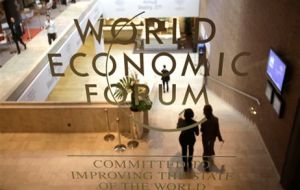MercoPress. South Atlantic News Agency
Davos Economic Forum Gets Underway, Adjusting to “New Reality”

Adjusting to the “new reality,” was top of the agenda at the World Economic Forum on Tuesday. Some 2,500 business leaders, politicians and social activists are looking forward, while trying to anticipate unexpected shocks, it was reported.
“The post-crisis era should not be the pre-crisis era,” Forum founder and chairman Klaus Schwab said, in Davos. “We should have learned and we should avoid the exuberance. One of the key issues will be exactly the question 'Are we out of the crisis or is it much more an artificial consequence of all the measures which have been undertaken.'”
The annual meeting, which gets underway on Wednesday, is focused on the theme “Shared Norms for the New Reality,” a concept that organizers said reflected the concern of leaders about “living in a world that is becoming increasingly complex and interconnected and, at the same time, experiencing an erosion of common values that undermines public trust in leadership as well as future economic growth and political stability.”
Richard Edelman, president and CEO of Edelman Inc., noted that embracing more openness in business, in politics and elsewhere can go a long way in keeping people's trust resilient.
“The recovery of trust in the chief executive is big and that's across the world,” he said in speaking of the annual Edelman Trust Barometer which was released Tuesday. In it, the report, now in its 11th year, found that trust in business was up two percentage points globally since last year led by surges in Brazil and Germany — whose economies have grown strongly.
But in the United States, trust in government, corporations and media was down by eight percentage points, to just 46 percent of people saying they trusted all of those institutions — and trust in banks all but collapsed.
In the US, trust in banks plummeted, falling from No. 3 in 2008 to second from last in 2011. The same was found in Ireland, where banks scored an all-time barometer low for least trusted industry with only 6 percent expressing trust. In the United Kingdom, trust in banks slid 30 points to 16 percent.
Banks in the United States helped fuel the boom in home loans to people with shaky credit, then needed government help after the real estate market collapsed. In Ireland, taxpayers are on the hook for a government bank rescue so expensive it forced the country to seek a bailout from the European Union and the International Monetary Fund.
The survey was done by Edelman's research firm Strategy One from October 11th to November 28th and polled 5,075 people in 23 countries.
The report — one of a slew pegged to the annual Davos meeting — came shortly after the United Nations figures said 205 million people were unemployed last year and that little improvement was expected in 2011.
Governments and labour activists have expressed concern that the recovery might see 'growth without jobs,' leading to social unrest.
The International Labour Organization said the number of jobless worldwide held steady in 2010 and is forecast to dip less than 1 percent this year to 203.3 million. There are 27.6 million more people out of work today than when the financial crisis started in 2007, it said.
Still, some executives were upbeat about the post-crisis environment.
PwC's 14th annual Global CEO Survey found that of 1,201 CEOs polled, 48 percent said they were “very confident” about growth in the coming year, far more than the 31 percent who had such sentiments a year earlier and near to the 50 percent from the 2008 survey.
“Last year it was all about back to basics,” said Dennis Nally, chairman of PwC International Ltd. “This year it's about increased confidence and seizing opportunities that are really out there. I think the confidence levels do go back to pre-crisis levels”
Similarly, the survey found that 88 percent of all CEOs had “some level of confidence for prospects” in the next 12 months while 94 percent were confident of growth three years from now. The sentiment was shared across all continents.
As for the nations identified as the most important for future growth, China was named by 39 percent of the executives, with the US at 21 percent; Brazil, 19 percent; and India at 18 percent.
James Quigley, CEO of Deloitte Touche Tohmatsu Limited, said that his company's hiring has returned to pre-crisis levels and is experiencing strong growth.
“And I believe many business leaders are going to come with their businesses in that same condition,” he said. “So I think we're going to have a much more optimistic tone. Some will still attach the word cautious to that, but I am optimistic, and I believe that a sustained recovery has begun.”




Top Comments
Disclaimer & comment rulesCommenting for this story is now closed.
If you have a Facebook account, become a fan and comment on our Facebook Page!